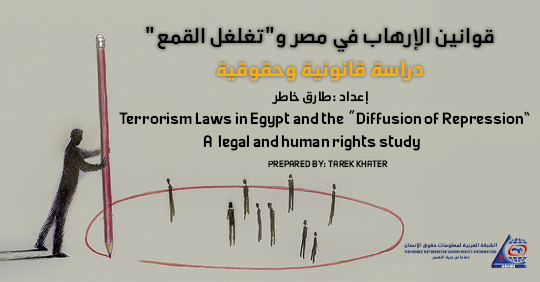
Cairo: 16 July 2020
The Arabic Network for Human Rights Information (ANHRI) said today that its role in defending freedom of expression and public freedoms- like any other independent organizations that work on establishing the rule of law- has diminished. ANHRI’s lawyers and researchers are facing dozens of legal provisions permeating into the Egyptian Penal Code and the laws that are passed under the guise of fighting terrorism, which abound with articles that criminalize the expression of opinion and the voicing of criticism- and even one’s deep intention- and crack down on peaceful practices.
Since its promulgation upon a decree by the President of the Republic under the full glare of an elected parliament, the Law No. 94 of 2015 has created a climate of fear making everyone threatened to be branded or stigmatized as “terrorist”. This is because of its extensive and unjustified expansion of the criminalization of terrorist acts, through its loose and overly broad terms which can be interpreted to the whims of law enforcement officials. Under this law, thousands of citizens, political opponents, journalists, lawyers, human rights defenders, and activists are subject to prosecution and many of them are languishing behind bars for merely speaking out against the government’s policies, or for voicing their criticism, writing an article, or organizing a protest.
Therefore, it has become necessary to take a closer look at Egypt’s successive terrorism laws since the promulgation of the first law in 1992 to the latest amendments added to counter-terrorism laws in March of this year.
In this context, ANHRI has released a legal study entitled “Terrorism Laws in Egypt and the Diffusion of Repression” to shed light on terrorism laws and how lawmakers comply with Egypt’s obligations under international law. The study details the consequences of the security services and judicial authorities’ implementation of these laws, and how this might affect, whether positively or negatively, the state of private and public rights and freedoms guaranteed by the Constitution. It also provides a few examples of cases in which the accused persons have been charged with violating the terrorism laws’ provisions, although they didn’t commit, or incite to commit, any violent act. Rather, they have been prosecuted against the backdrop of practicing their rights to assembly or because of voicing their views and beliefs.
ANHRI reiterates its assertion that the most effective way to confront terrorism is to allow the exercising of the political will and the immediate call for a societal dialogue between all parties that renounce violence, in order to set out serious and effective steps to address the roots of extremism and violence, rather than adopting an approach to expand the promulgation and implementation of exceptional laws, which continue to plague the state’s legal elements and apparatuses and undermine citizens’ rights and freedoms. That notwithstanding, the real terrorism is still rampant in the country claiming the lives of more innocent people and eroding the reputation of the country and its capabilities and future.
Finally, ANHRI calls for the abolition of terrorism laws urging the authorities and to depend only on the provisions of the Egyptian general criminal law (Penal Code – Criminal Procedure Law) to confront crimes of violence and terrorism, as an alternative to terrorism laws, which consolidate and entrench a state of emergency and exceptional circumstances in the country, while unequivocally disavowing Egypt’s obligations t to protect the rights of their citizens and establish the rule of law.
You can check the study through the following link:







